Email Answers: Healthcare Advice on HRT and Menopause
VerifiedAdded on 2022/08/12
|8
|2277
|15
Homework Assignment
AI Summary
This assignment presents a series of email responses providing healthcare advice to colleagues regarding patients experiencing menopausal symptoms. The first email addresses a 51-year-old woman with severe hot flushes and a history of hysterectomy, exploring the possibility of HRT and discussing potential risks and prescriptions. The second email concerns a 59-year-old woman who has been on HRT since menopause, examining current research and the benefits versus risks of continued treatment, including side effects and alternatives. The third email focuses on a 31-year-old woman with early signs of menopause, analyzing her test results (Oestradiol, LH, and FSH levels) and suggesting treatments like stem cell therapy, hormonal therapy, and supplements, while also considering potential risks and long-term management strategies. The responses emphasize patient-centered care, providing information on various treatment options, potential side effects, and the importance of informed decision-making. The assignment provides a comprehensive overview of patient care in the context of menopause and HRT.
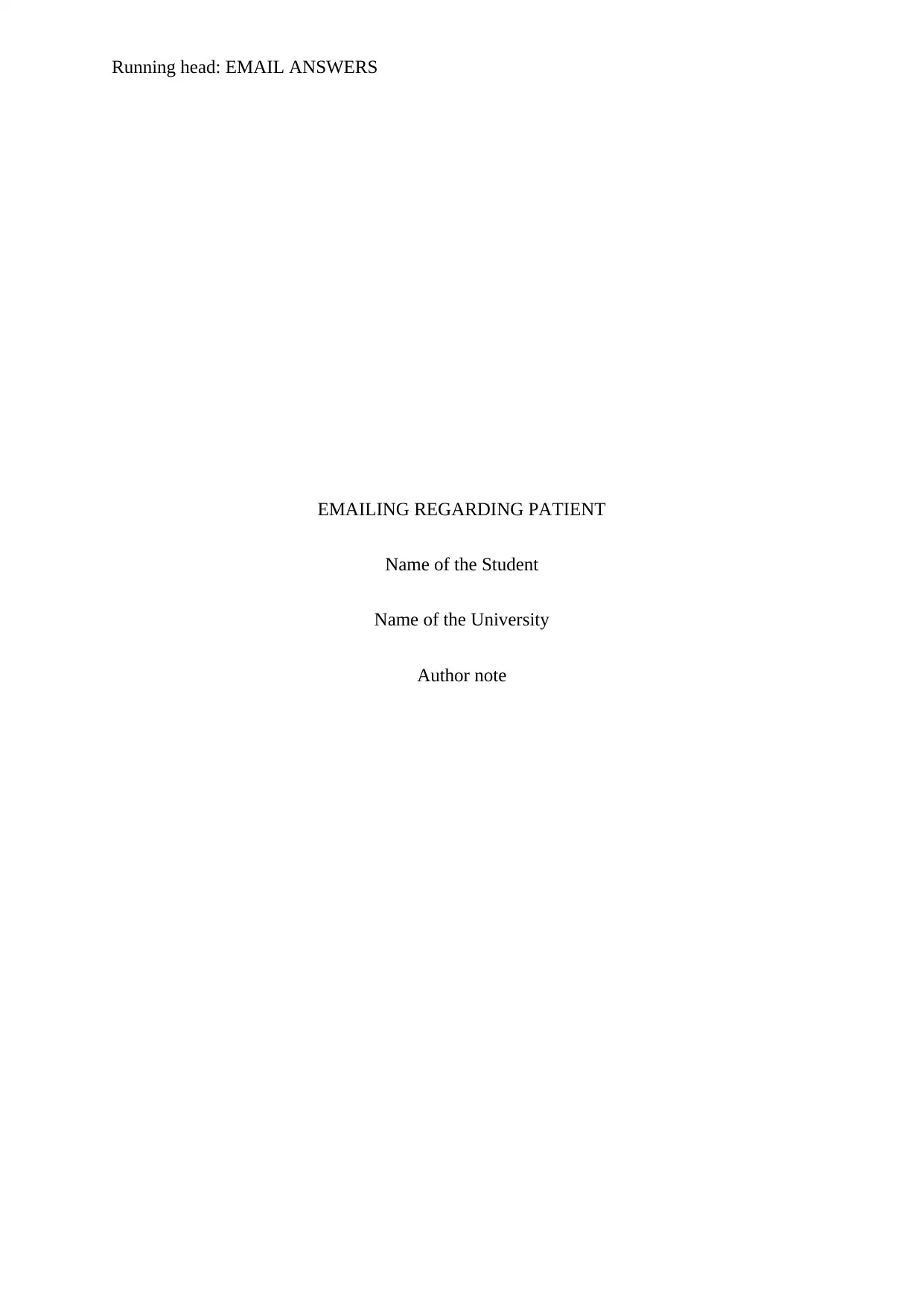
Running head: EMAIL ANSWERS
EMAILING REGARDING PATIENT
Name of the Student
Name of the University
Author note
EMAILING REGARDING PATIENT
Name of the Student
Name of the University
Author note
Paraphrase This Document
Need a fresh take? Get an instant paraphrase of this document with our AI Paraphraser
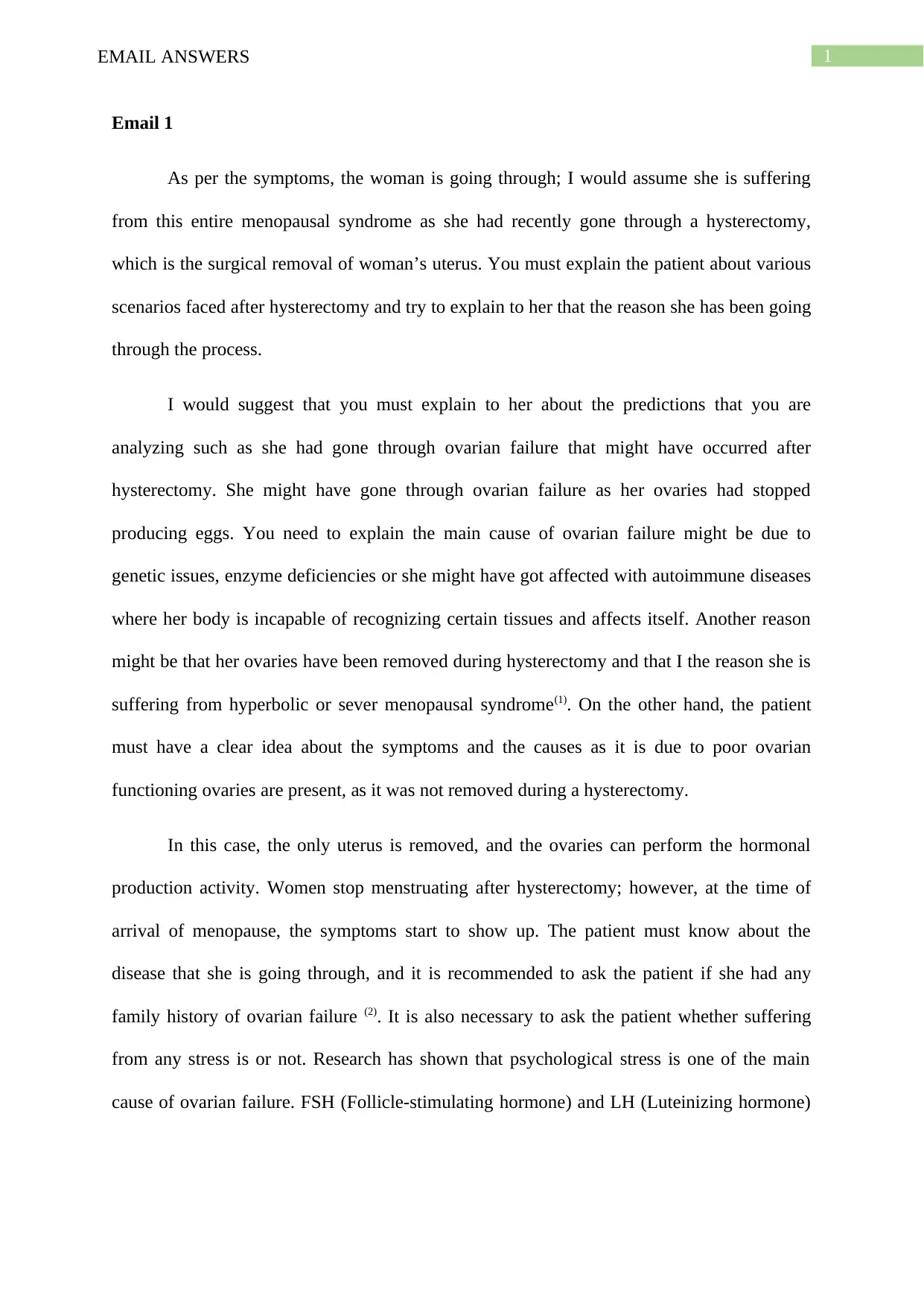
1EMAIL ANSWERS
Email 1
As per the symptoms, the woman is going through; I would assume she is suffering
from this entire menopausal syndrome as she had recently gone through a hysterectomy,
which is the surgical removal of woman’s uterus. You must explain the patient about various
scenarios faced after hysterectomy and try to explain to her that the reason she has been going
through the process.
I would suggest that you must explain to her about the predictions that you are
analyzing such as she had gone through ovarian failure that might have occurred after
hysterectomy. She might have gone through ovarian failure as her ovaries had stopped
producing eggs. You need to explain the main cause of ovarian failure might be due to
genetic issues, enzyme deficiencies or she might have got affected with autoimmune diseases
where her body is incapable of recognizing certain tissues and affects itself. Another reason
might be that her ovaries have been removed during hysterectomy and that I the reason she is
suffering from hyperbolic or sever menopausal syndrome(1). On the other hand, the patient
must have a clear idea about the symptoms and the causes as it is due to poor ovarian
functioning ovaries are present, as it was not removed during a hysterectomy.
In this case, the only uterus is removed, and the ovaries can perform the hormonal
production activity. Women stop menstruating after hysterectomy; however, at the time of
arrival of menopause, the symptoms start to show up. The patient must know about the
disease that she is going through, and it is recommended to ask the patient if she had any
family history of ovarian failure (2). It is also necessary to ask the patient whether suffering
from any stress is or not. Research has shown that psychological stress is one of the main
cause of ovarian failure. FSH (Follicle-stimulating hormone) and LH (Luteinizing hormone)
Email 1
As per the symptoms, the woman is going through; I would assume she is suffering
from this entire menopausal syndrome as she had recently gone through a hysterectomy,
which is the surgical removal of woman’s uterus. You must explain the patient about various
scenarios faced after hysterectomy and try to explain to her that the reason she has been going
through the process.
I would suggest that you must explain to her about the predictions that you are
analyzing such as she had gone through ovarian failure that might have occurred after
hysterectomy. She might have gone through ovarian failure as her ovaries had stopped
producing eggs. You need to explain the main cause of ovarian failure might be due to
genetic issues, enzyme deficiencies or she might have got affected with autoimmune diseases
where her body is incapable of recognizing certain tissues and affects itself. Another reason
might be that her ovaries have been removed during hysterectomy and that I the reason she is
suffering from hyperbolic or sever menopausal syndrome(1). On the other hand, the patient
must have a clear idea about the symptoms and the causes as it is due to poor ovarian
functioning ovaries are present, as it was not removed during a hysterectomy.
In this case, the only uterus is removed, and the ovaries can perform the hormonal
production activity. Women stop menstruating after hysterectomy; however, at the time of
arrival of menopause, the symptoms start to show up. The patient must know about the
disease that she is going through, and it is recommended to ask the patient if she had any
family history of ovarian failure (2). It is also necessary to ask the patient whether suffering
from any stress is or not. Research has shown that psychological stress is one of the main
cause of ovarian failure. FSH (Follicle-stimulating hormone) and LH (Luteinizing hormone)
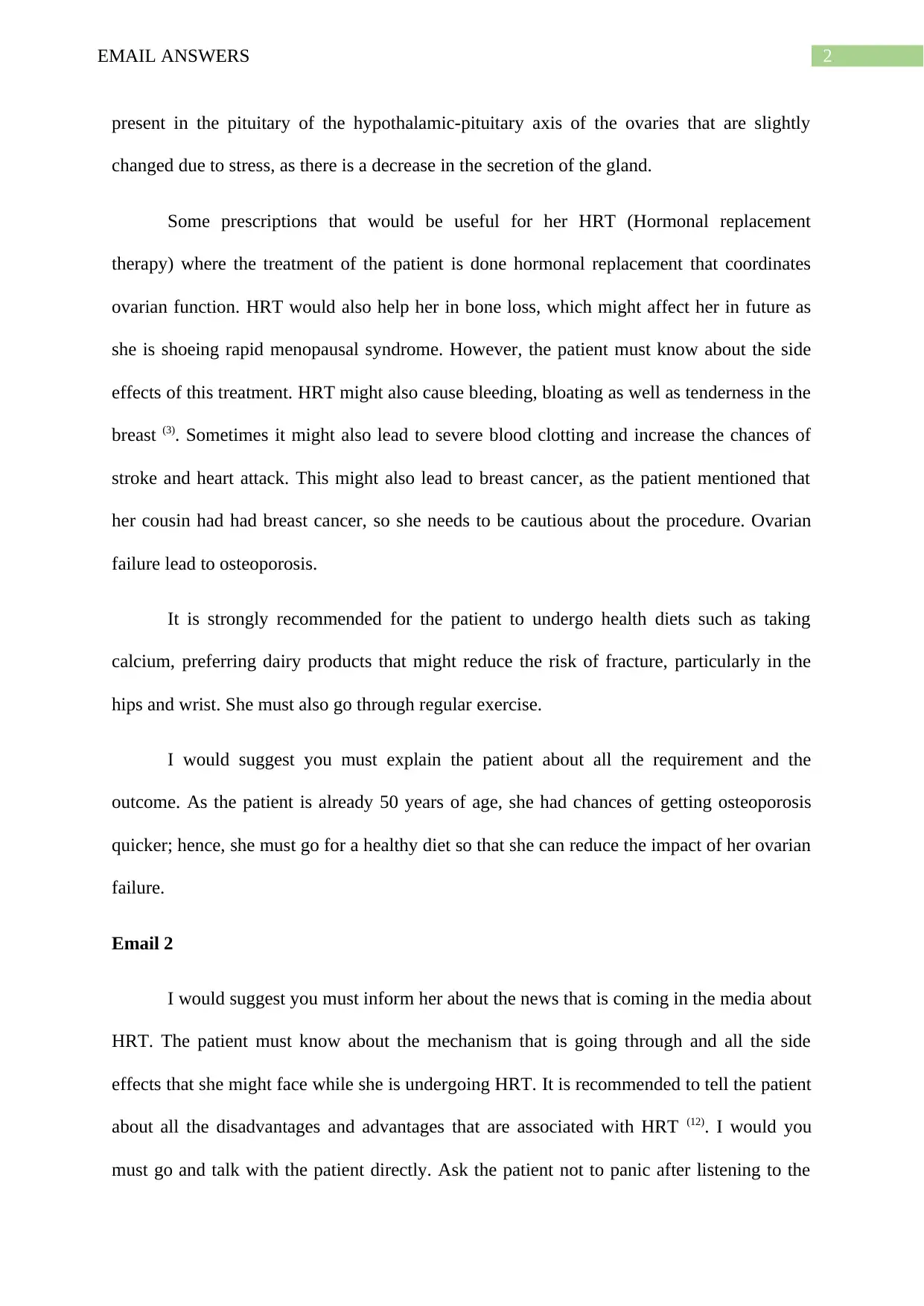
2EMAIL ANSWERS
present in the pituitary of the hypothalamic-pituitary axis of the ovaries that are slightly
changed due to stress, as there is a decrease in the secretion of the gland.
Some prescriptions that would be useful for her HRT (Hormonal replacement
therapy) where the treatment of the patient is done hormonal replacement that coordinates
ovarian function. HRT would also help her in bone loss, which might affect her in future as
she is shoeing rapid menopausal syndrome. However, the patient must know about the side
effects of this treatment. HRT might also cause bleeding, bloating as well as tenderness in the
breast (3). Sometimes it might also lead to severe blood clotting and increase the chances of
stroke and heart attack. This might also lead to breast cancer, as the patient mentioned that
her cousin had had breast cancer, so she needs to be cautious about the procedure. Ovarian
failure lead to osteoporosis.
It is strongly recommended for the patient to undergo health diets such as taking
calcium, preferring dairy products that might reduce the risk of fracture, particularly in the
hips and wrist. She must also go through regular exercise.
I would suggest you must explain the patient about all the requirement and the
outcome. As the patient is already 50 years of age, she had chances of getting osteoporosis
quicker; hence, she must go for a healthy diet so that she can reduce the impact of her ovarian
failure.
Email 2
I would suggest you must inform her about the news that is coming in the media about
HRT. The patient must know about the mechanism that is going through and all the side
effects that she might face while she is undergoing HRT. It is recommended to tell the patient
about all the disadvantages and advantages that are associated with HRT (12). I would you
must go and talk with the patient directly. Ask the patient not to panic after listening to the
present in the pituitary of the hypothalamic-pituitary axis of the ovaries that are slightly
changed due to stress, as there is a decrease in the secretion of the gland.
Some prescriptions that would be useful for her HRT (Hormonal replacement
therapy) where the treatment of the patient is done hormonal replacement that coordinates
ovarian function. HRT would also help her in bone loss, which might affect her in future as
she is shoeing rapid menopausal syndrome. However, the patient must know about the side
effects of this treatment. HRT might also cause bleeding, bloating as well as tenderness in the
breast (3). Sometimes it might also lead to severe blood clotting and increase the chances of
stroke and heart attack. This might also lead to breast cancer, as the patient mentioned that
her cousin had had breast cancer, so she needs to be cautious about the procedure. Ovarian
failure lead to osteoporosis.
It is strongly recommended for the patient to undergo health diets such as taking
calcium, preferring dairy products that might reduce the risk of fracture, particularly in the
hips and wrist. She must also go through regular exercise.
I would suggest you must explain the patient about all the requirement and the
outcome. As the patient is already 50 years of age, she had chances of getting osteoporosis
quicker; hence, she must go for a healthy diet so that she can reduce the impact of her ovarian
failure.
Email 2
I would suggest you must inform her about the news that is coming in the media about
HRT. The patient must know about the mechanism that is going through and all the side
effects that she might face while she is undergoing HRT. It is recommended to tell the patient
about all the disadvantages and advantages that are associated with HRT (12). I would you
must go and talk with the patient directly. Ask the patient not to panic after listening to the
⊘ This is a preview!⊘
Do you want full access?
Subscribe today to unlock all pages.

Trusted by 1+ million students worldwide
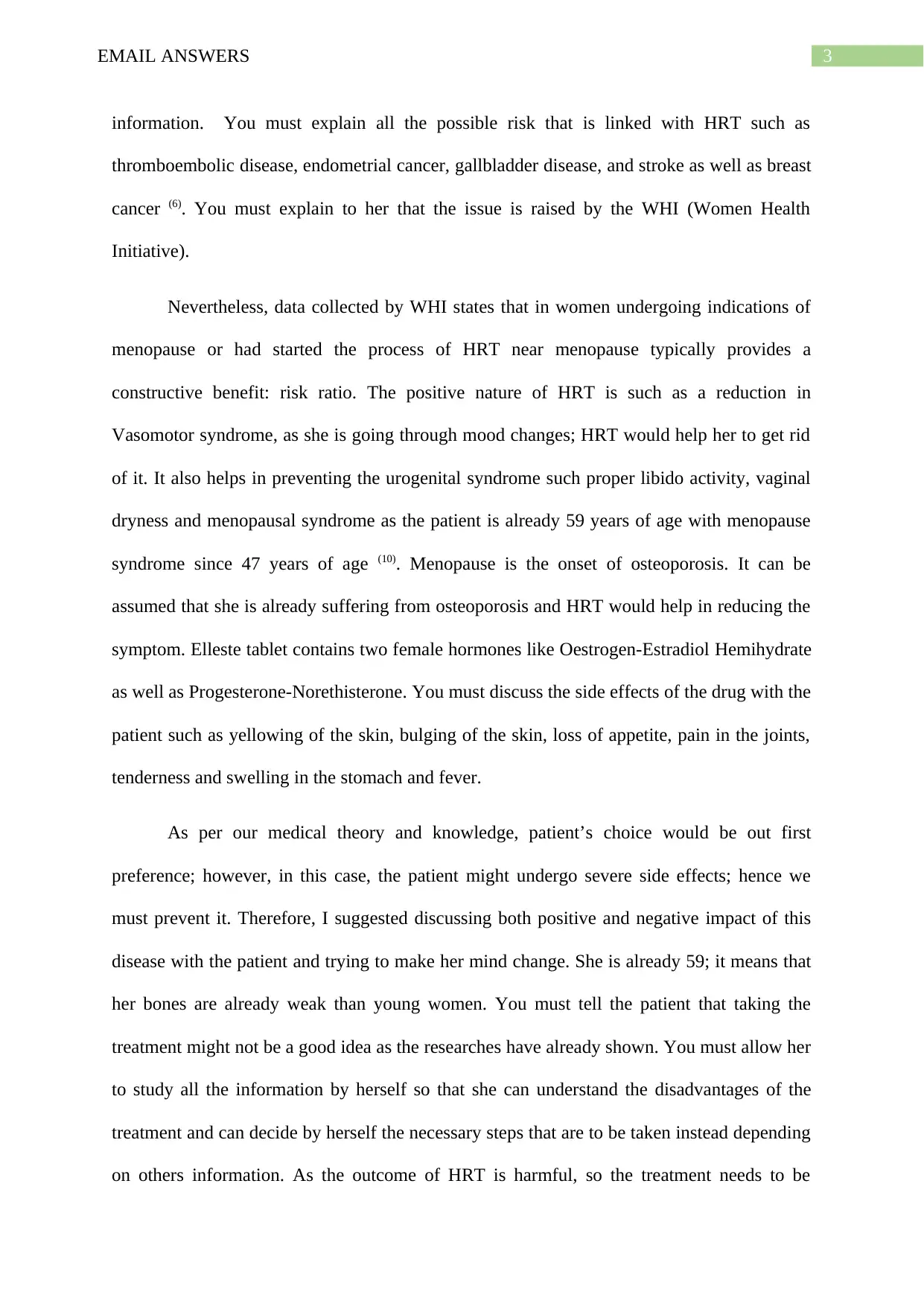
3EMAIL ANSWERS
information. You must explain all the possible risk that is linked with HRT such as
thromboembolic disease, endometrial cancer, gallbladder disease, and stroke as well as breast
cancer (6). You must explain to her that the issue is raised by the WHI (Women Health
Initiative).
Nevertheless, data collected by WHI states that in women undergoing indications of
menopause or had started the process of HRT near menopause typically provides a
constructive benefit: risk ratio. The positive nature of HRT is such as a reduction in
Vasomotor syndrome, as she is going through mood changes; HRT would help her to get rid
of it. It also helps in preventing the urogenital syndrome such proper libido activity, vaginal
dryness and menopausal syndrome as the patient is already 59 years of age with menopause
syndrome since 47 years of age (10). Menopause is the onset of osteoporosis. It can be
assumed that she is already suffering from osteoporosis and HRT would help in reducing the
symptom. Elleste tablet contains two female hormones like Oestrogen-Estradiol Hemihydrate
as well as Progesterone-Norethisterone. You must discuss the side effects of the drug with the
patient such as yellowing of the skin, bulging of the skin, loss of appetite, pain in the joints,
tenderness and swelling in the stomach and fever.
As per our medical theory and knowledge, patient’s choice would be out first
preference; however, in this case, the patient might undergo severe side effects; hence we
must prevent it. Therefore, I suggested discussing both positive and negative impact of this
disease with the patient and trying to make her mind change. She is already 59; it means that
her bones are already weak than young women. You must tell the patient that taking the
treatment might not be a good idea as the researches have already shown. You must allow her
to study all the information by herself so that she can understand the disadvantages of the
treatment and can decide by herself the necessary steps that are to be taken instead depending
on others information. As the outcome of HRT is harmful, so the treatment needs to be
information. You must explain all the possible risk that is linked with HRT such as
thromboembolic disease, endometrial cancer, gallbladder disease, and stroke as well as breast
cancer (6). You must explain to her that the issue is raised by the WHI (Women Health
Initiative).
Nevertheless, data collected by WHI states that in women undergoing indications of
menopause or had started the process of HRT near menopause typically provides a
constructive benefit: risk ratio. The positive nature of HRT is such as a reduction in
Vasomotor syndrome, as she is going through mood changes; HRT would help her to get rid
of it. It also helps in preventing the urogenital syndrome such proper libido activity, vaginal
dryness and menopausal syndrome as the patient is already 59 years of age with menopause
syndrome since 47 years of age (10). Menopause is the onset of osteoporosis. It can be
assumed that she is already suffering from osteoporosis and HRT would help in reducing the
symptom. Elleste tablet contains two female hormones like Oestrogen-Estradiol Hemihydrate
as well as Progesterone-Norethisterone. You must discuss the side effects of the drug with the
patient such as yellowing of the skin, bulging of the skin, loss of appetite, pain in the joints,
tenderness and swelling in the stomach and fever.
As per our medical theory and knowledge, patient’s choice would be out first
preference; however, in this case, the patient might undergo severe side effects; hence we
must prevent it. Therefore, I suggested discussing both positive and negative impact of this
disease with the patient and trying to make her mind change. She is already 59; it means that
her bones are already weak than young women. You must tell the patient that taking the
treatment might not be a good idea as the researches have already shown. You must allow her
to study all the information by herself so that she can understand the disadvantages of the
treatment and can decide by herself the necessary steps that are to be taken instead depending
on others information. As the outcome of HRT is harmful, so the treatment needs to be
Paraphrase This Document
Need a fresh take? Get an instant paraphrase of this document with our AI Paraphraser
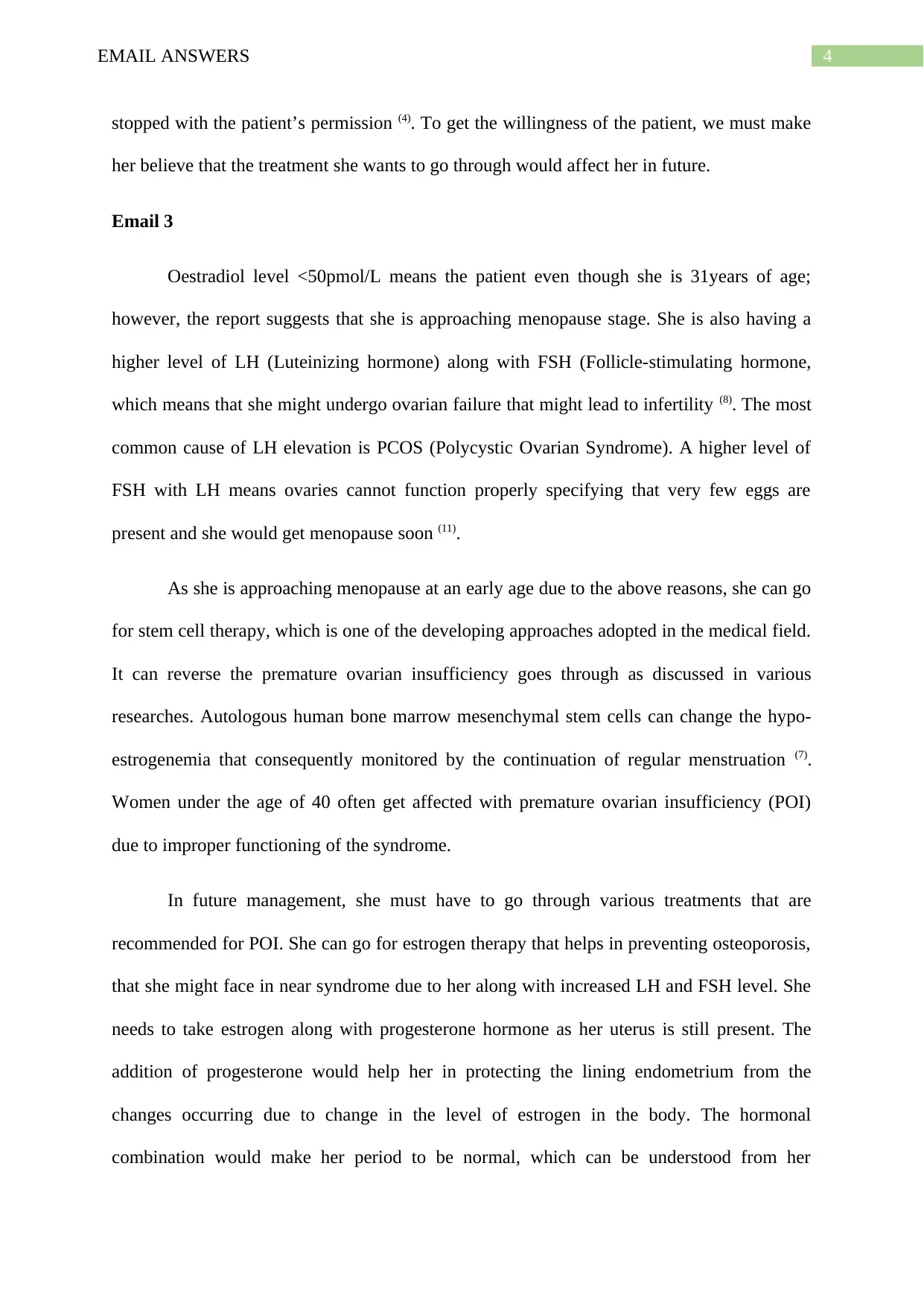
4EMAIL ANSWERS
stopped with the patient’s permission (4). To get the willingness of the patient, we must make
her believe that the treatment she wants to go through would affect her in future.
Email 3
Oestradiol level <50pmol/L means the patient even though she is 31years of age;
however, the report suggests that she is approaching menopause stage. She is also having a
higher level of LH (Luteinizing hormone) along with FSH (Follicle-stimulating hormone,
which means that she might undergo ovarian failure that might lead to infertility (8). The most
common cause of LH elevation is PCOS (Polycystic Ovarian Syndrome). A higher level of
FSH with LH means ovaries cannot function properly specifying that very few eggs are
present and she would get menopause soon (11).
As she is approaching menopause at an early age due to the above reasons, she can go
for stem cell therapy, which is one of the developing approaches adopted in the medical field.
It can reverse the premature ovarian insufficiency goes through as discussed in various
researches. Autologous human bone marrow mesenchymal stem cells can change the hypo-
estrogenemia that consequently monitored by the continuation of regular menstruation (7).
Women under the age of 40 often get affected with premature ovarian insufficiency (POI)
due to improper functioning of the syndrome.
In future management, she must have to go through various treatments that are
recommended for POI. She can go for estrogen therapy that helps in preventing osteoporosis,
that she might face in near syndrome due to her along with increased LH and FSH level. She
needs to take estrogen along with progesterone hormone as her uterus is still present. The
addition of progesterone would help her in protecting the lining endometrium from the
changes occurring due to change in the level of estrogen in the body. The hormonal
combination would make her period to be normal, which can be understood from her
stopped with the patient’s permission (4). To get the willingness of the patient, we must make
her believe that the treatment she wants to go through would affect her in future.
Email 3
Oestradiol level <50pmol/L means the patient even though she is 31years of age;
however, the report suggests that she is approaching menopause stage. She is also having a
higher level of LH (Luteinizing hormone) along with FSH (Follicle-stimulating hormone,
which means that she might undergo ovarian failure that might lead to infertility (8). The most
common cause of LH elevation is PCOS (Polycystic Ovarian Syndrome). A higher level of
FSH with LH means ovaries cannot function properly specifying that very few eggs are
present and she would get menopause soon (11).
As she is approaching menopause at an early age due to the above reasons, she can go
for stem cell therapy, which is one of the developing approaches adopted in the medical field.
It can reverse the premature ovarian insufficiency goes through as discussed in various
researches. Autologous human bone marrow mesenchymal stem cells can change the hypo-
estrogenemia that consequently monitored by the continuation of regular menstruation (7).
Women under the age of 40 often get affected with premature ovarian insufficiency (POI)
due to improper functioning of the syndrome.
In future management, she must have to go through various treatments that are
recommended for POI. She can go for estrogen therapy that helps in preventing osteoporosis,
that she might face in near syndrome due to her along with increased LH and FSH level. She
needs to take estrogen along with progesterone hormone as her uterus is still present. The
addition of progesterone would help her in protecting the lining endometrium from the
changes occurring due to change in the level of estrogen in the body. The hormonal
combination would make her period to be normal, which can be understood from her
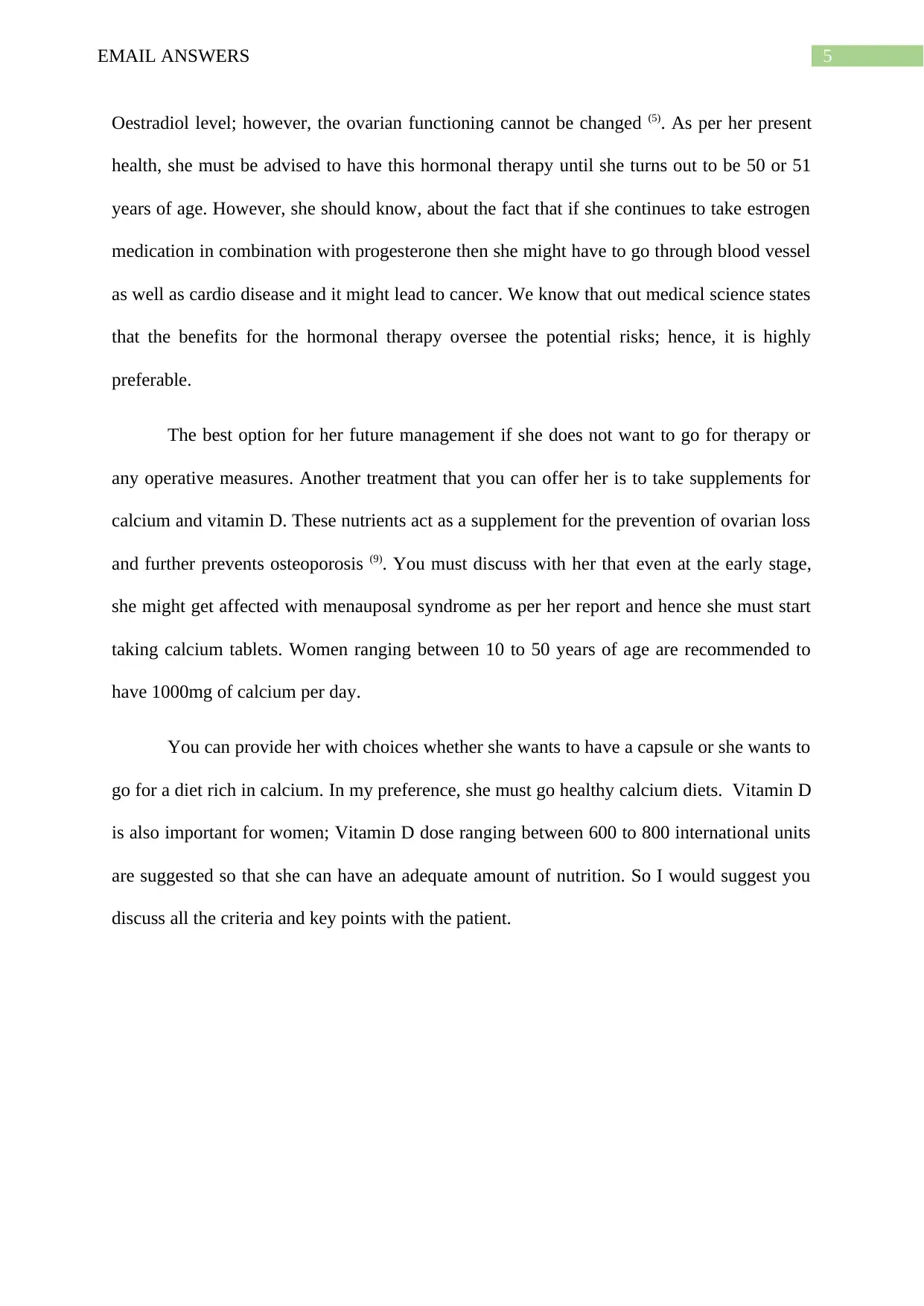
5EMAIL ANSWERS
Oestradiol level; however, the ovarian functioning cannot be changed (5). As per her present
health, she must be advised to have this hormonal therapy until she turns out to be 50 or 51
years of age. However, she should know, about the fact that if she continues to take estrogen
medication in combination with progesterone then she might have to go through blood vessel
as well as cardio disease and it might lead to cancer. We know that out medical science states
that the benefits for the hormonal therapy oversee the potential risks; hence, it is highly
preferable.
The best option for her future management if she does not want to go for therapy or
any operative measures. Another treatment that you can offer her is to take supplements for
calcium and vitamin D. These nutrients act as a supplement for the prevention of ovarian loss
and further prevents osteoporosis (9). You must discuss with her that even at the early stage,
she might get affected with menauposal syndrome as per her report and hence she must start
taking calcium tablets. Women ranging between 10 to 50 years of age are recommended to
have 1000mg of calcium per day.
You can provide her with choices whether she wants to have a capsule or she wants to
go for a diet rich in calcium. In my preference, she must go healthy calcium diets. Vitamin D
is also important for women; Vitamin D dose ranging between 600 to 800 international units
are suggested so that she can have an adequate amount of nutrition. So I would suggest you
discuss all the criteria and key points with the patient.
Oestradiol level; however, the ovarian functioning cannot be changed (5). As per her present
health, she must be advised to have this hormonal therapy until she turns out to be 50 or 51
years of age. However, she should know, about the fact that if she continues to take estrogen
medication in combination with progesterone then she might have to go through blood vessel
as well as cardio disease and it might lead to cancer. We know that out medical science states
that the benefits for the hormonal therapy oversee the potential risks; hence, it is highly
preferable.
The best option for her future management if she does not want to go for therapy or
any operative measures. Another treatment that you can offer her is to take supplements for
calcium and vitamin D. These nutrients act as a supplement for the prevention of ovarian loss
and further prevents osteoporosis (9). You must discuss with her that even at the early stage,
she might get affected with menauposal syndrome as per her report and hence she must start
taking calcium tablets. Women ranging between 10 to 50 years of age are recommended to
have 1000mg of calcium per day.
You can provide her with choices whether she wants to have a capsule or she wants to
go for a diet rich in calcium. In my preference, she must go healthy calcium diets. Vitamin D
is also important for women; Vitamin D dose ranging between 600 to 800 international units
are suggested so that she can have an adequate amount of nutrition. So I would suggest you
discuss all the criteria and key points with the patient.
⊘ This is a preview!⊘
Do you want full access?
Subscribe today to unlock all pages.

Trusted by 1+ million students worldwide
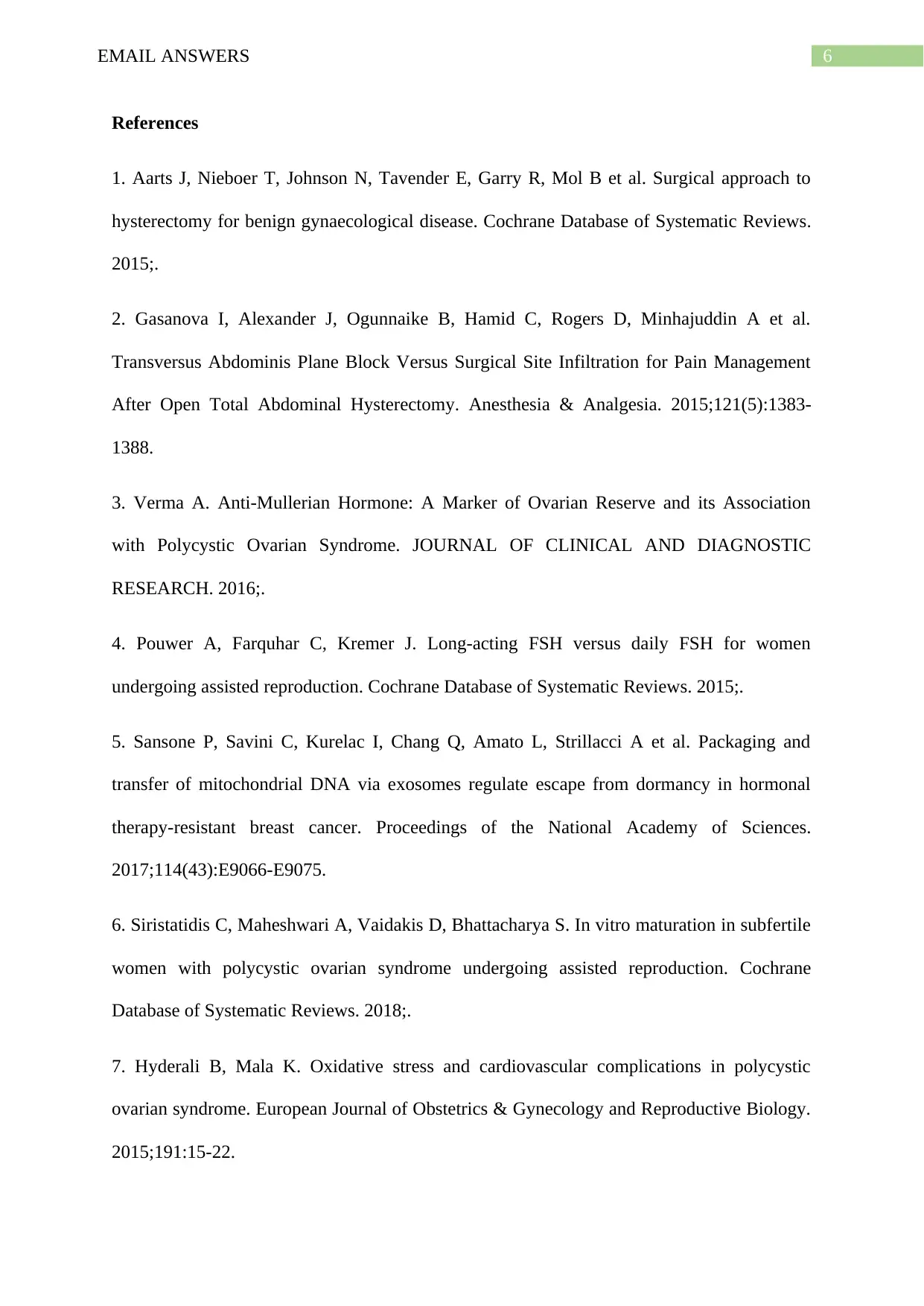
6EMAIL ANSWERS
References
1. Aarts J, Nieboer T, Johnson N, Tavender E, Garry R, Mol B et al. Surgical approach to
hysterectomy for benign gynaecological disease. Cochrane Database of Systematic Reviews.
2015;.
2. Gasanova I, Alexander J, Ogunnaike B, Hamid C, Rogers D, Minhajuddin A et al.
Transversus Abdominis Plane Block Versus Surgical Site Infiltration for Pain Management
After Open Total Abdominal Hysterectomy. Anesthesia & Analgesia. 2015;121(5):1383-
1388.
3. Verma A. Anti-Mullerian Hormone: A Marker of Ovarian Reserve and its Association
with Polycystic Ovarian Syndrome. JOURNAL OF CLINICAL AND DIAGNOSTIC
RESEARCH. 2016;.
4. Pouwer A, Farquhar C, Kremer J. Long-acting FSH versus daily FSH for women
undergoing assisted reproduction. Cochrane Database of Systematic Reviews. 2015;.
5. Sansone P, Savini C, Kurelac I, Chang Q, Amato L, Strillacci A et al. Packaging and
transfer of mitochondrial DNA via exosomes regulate escape from dormancy in hormonal
therapy-resistant breast cancer. Proceedings of the National Academy of Sciences.
2017;114(43):E9066-E9075.
6. Siristatidis C, Maheshwari A, Vaidakis D, Bhattacharya S. In vitro maturation in subfertile
women with polycystic ovarian syndrome undergoing assisted reproduction. Cochrane
Database of Systematic Reviews. 2018;.
7. Hyderali B, Mala K. Oxidative stress and cardiovascular complications in polycystic
ovarian syndrome. European Journal of Obstetrics & Gynecology and Reproductive Biology.
2015;191:15-22.
References
1. Aarts J, Nieboer T, Johnson N, Tavender E, Garry R, Mol B et al. Surgical approach to
hysterectomy for benign gynaecological disease. Cochrane Database of Systematic Reviews.
2015;.
2. Gasanova I, Alexander J, Ogunnaike B, Hamid C, Rogers D, Minhajuddin A et al.
Transversus Abdominis Plane Block Versus Surgical Site Infiltration for Pain Management
After Open Total Abdominal Hysterectomy. Anesthesia & Analgesia. 2015;121(5):1383-
1388.
3. Verma A. Anti-Mullerian Hormone: A Marker of Ovarian Reserve and its Association
with Polycystic Ovarian Syndrome. JOURNAL OF CLINICAL AND DIAGNOSTIC
RESEARCH. 2016;.
4. Pouwer A, Farquhar C, Kremer J. Long-acting FSH versus daily FSH for women
undergoing assisted reproduction. Cochrane Database of Systematic Reviews. 2015;.
5. Sansone P, Savini C, Kurelac I, Chang Q, Amato L, Strillacci A et al. Packaging and
transfer of mitochondrial DNA via exosomes regulate escape from dormancy in hormonal
therapy-resistant breast cancer. Proceedings of the National Academy of Sciences.
2017;114(43):E9066-E9075.
6. Siristatidis C, Maheshwari A, Vaidakis D, Bhattacharya S. In vitro maturation in subfertile
women with polycystic ovarian syndrome undergoing assisted reproduction. Cochrane
Database of Systematic Reviews. 2018;.
7. Hyderali B, Mala K. Oxidative stress and cardiovascular complications in polycystic
ovarian syndrome. European Journal of Obstetrics & Gynecology and Reproductive Biology.
2015;191:15-22.
Paraphrase This Document
Need a fresh take? Get an instant paraphrase of this document with our AI Paraphraser
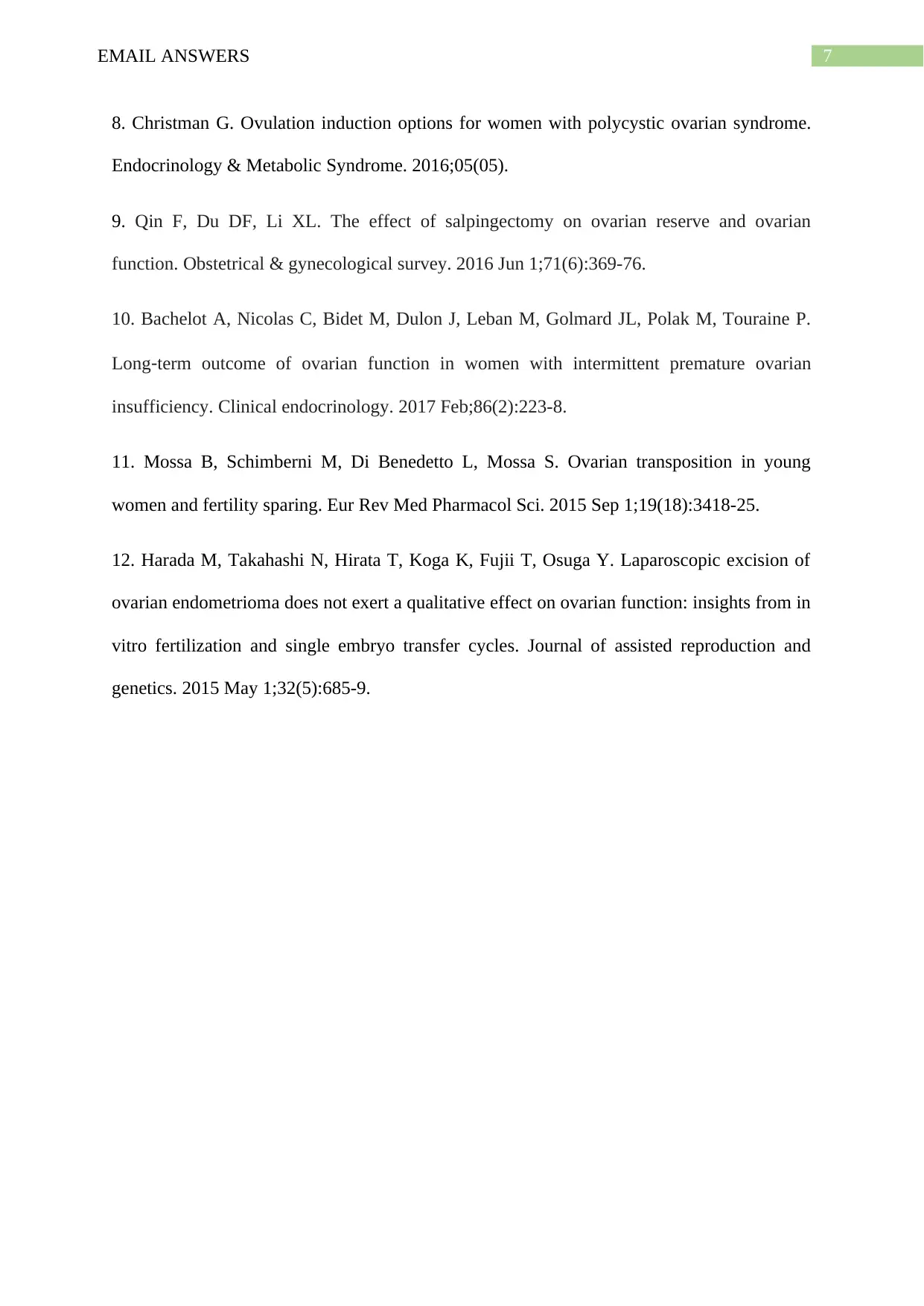
7EMAIL ANSWERS
8. Christman G. Ovulation induction options for women with polycystic ovarian syndrome.
Endocrinology & Metabolic Syndrome. 2016;05(05).
9. Qin F, Du DF, Li XL. The effect of salpingectomy on ovarian reserve and ovarian
function. Obstetrical & gynecological survey. 2016 Jun 1;71(6):369-76.
10. Bachelot A, Nicolas C, Bidet M, Dulon J, Leban M, Golmard JL, Polak M, Touraine P.
Long‐term outcome of ovarian function in women with intermittent premature ovarian
insufficiency. Clinical endocrinology. 2017 Feb;86(2):223-8.
11. Mossa B, Schimberni M, Di Benedetto L, Mossa S. Ovarian transposition in young
women and fertility sparing. Eur Rev Med Pharmacol Sci. 2015 Sep 1;19(18):3418-25.
12. Harada M, Takahashi N, Hirata T, Koga K, Fujii T, Osuga Y. Laparoscopic excision of
ovarian endometrioma does not exert a qualitative effect on ovarian function: insights from in
vitro fertilization and single embryo transfer cycles. Journal of assisted reproduction and
genetics. 2015 May 1;32(5):685-9.
8. Christman G. Ovulation induction options for women with polycystic ovarian syndrome.
Endocrinology & Metabolic Syndrome. 2016;05(05).
9. Qin F, Du DF, Li XL. The effect of salpingectomy on ovarian reserve and ovarian
function. Obstetrical & gynecological survey. 2016 Jun 1;71(6):369-76.
10. Bachelot A, Nicolas C, Bidet M, Dulon J, Leban M, Golmard JL, Polak M, Touraine P.
Long‐term outcome of ovarian function in women with intermittent premature ovarian
insufficiency. Clinical endocrinology. 2017 Feb;86(2):223-8.
11. Mossa B, Schimberni M, Di Benedetto L, Mossa S. Ovarian transposition in young
women and fertility sparing. Eur Rev Med Pharmacol Sci. 2015 Sep 1;19(18):3418-25.
12. Harada M, Takahashi N, Hirata T, Koga K, Fujii T, Osuga Y. Laparoscopic excision of
ovarian endometrioma does not exert a qualitative effect on ovarian function: insights from in
vitro fertilization and single embryo transfer cycles. Journal of assisted reproduction and
genetics. 2015 May 1;32(5):685-9.
1 out of 8
Related Documents
Your All-in-One AI-Powered Toolkit for Academic Success.
+13062052269
info@desklib.com
Available 24*7 on WhatsApp / Email
![[object Object]](/_next/static/media/star-bottom.7253800d.svg)
Unlock your academic potential
Copyright © 2020–2026 A2Z Services. All Rights Reserved. Developed and managed by ZUCOL.



